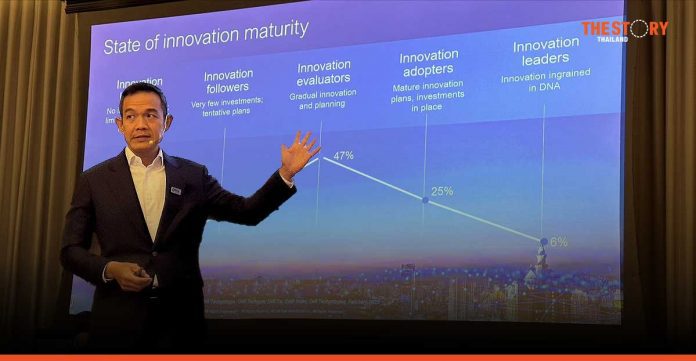The Dell Technologies Innovation Index reveals 66% in Thailand (APJ: 60%; Global: 57%) fear their organization could be irrelevant in 3-5 years, based on the health of their innovation pipeline and culture. A new global study, polling 6,600 employees across 45+ countries, illustrates why innovation is business critical and how organizations should harness their people, processes, and technologies to innovate effectively. The APJ study polled 1,700 employees in Thailand, Australia and New Zealand, India, Japan, Malaysia, Singapore, and South Korea.
“Technology continues to be a critical pillar to an organization’s business strategy to help them transform and grow. The market dynamics create myriad opportunities for businesses. While the Innovation Index study reveals Thailand organizations are leading in the Innovation Leader category compared to its peers in the region, vast majority still need to make the decision on where they want to be in the immediate future,” said Thitaphon Boonprasit, managing director, Thailand, Dell Technologies. “They can do this by aligning their company goals and nurturing a culture of curiosity by leveraging technology, people and processes.”
Innovation is business-critical
Through assessing organizations, respondents are placed on an innovation maturity benchmark ranging from Innovation Leaders to Innovation Laggards. Per the analysis, just 31% (APJ: 17%; Global: 18%) of organizations in Thailand/APJ/worldwide can be defined as Innovation Leaders and Adopters. They have an end-to-end innovation strategy and are well placed to navigate headwinds coming from a global recession, supply chain issues, environmental impacts and more, and continue to grow.
In fact, 52% of the Thai Innovation Leaders and Adopters (APJ: 51%; Global: 50%) are confident that they can accelerate their innovation during a recession. This “innovation resilience” (i.e., determination and ability to innovate during tough times) pays off as32% of ThaiInnovation Leaders and Adopters (APJ: 33%; Global: 32%) experience up to 15% higher levels of revenue growth than in 2022.
Additionally, they have less challenges to secure and retain the skilled IT labour needed to drive innovation. Another contribution factor might be that 65% of Thai Innovation Leaders and Adopters (APJ: 73%; Global 75%) have fully embraced automation to combat manual and time-consuming IT processes and speed up innovation.
People-primed innovation
Organizations need help to develop an innovation culture where all ideas can make a difference and learning through failure is encouraged, based on the following findings:
- 64% of Thai respondents (APJ: 59%; Global: 59%) believe people leave their company because they haven’t been able to innovate as much as they hoped they would.
- 61% in Thailand (APJ: 63%; Global: 64%) say aspects of their company’s culture are holding them back from being as innovative as they want to be/can be.
Company culture is set and modeled by leadership but 71% in Thailand (APJ: 73%; Global: 71%) say their leaders are more inclined to favor their own ideas. Some of the top cited personal barriers to innovation are a fear of failure and a lack of confidence to share ideas with leaders.
Process-primed innovation
Similarly, the Innovation Index reveals that businesses are struggling to embed a structured, data-driven innovation process to realize innovation across the organization. Key findings include:
- Up to 56% of IT Decision Makers in Thailand (APJ: 28%; Global: 26%) say all their innovation efforts are based on data.
- Only 37% of organizations in Thailand (APJ: 46%; Global: 52%) are aligning innovation projects to company goals. It’s likely, this lack of process and strategy is part of the reason why organizations are struggling to prioritize innovation: the top cited barrier to innovation impacting teams is a lack of time to innovate due to overwhelming workloads (Thailand: 36%; APJ: 40%; Global: 38%).
Technology-primed innovation
The study findings point to the power of technology to enable innovation and the consequences of falling behind.
The vast majority Thailand: 99% (APJ: 84%; Global: 86%) are actively seeking out technologies to help them realize their innovation goal. Conversely Thailand: 49% (APJ: 58%; Global: 57%) believe their technology is not cutting-edge and fear they will fall behind their competitors.
The study explores where organizations are making gains and facing obstacles, across five technology catalysts for innovation: multi-cloud, edge, modern data infrastructure, anywhere-work, and cybersecurity. In nearly all areas, the greatest stumbling block to unlocking that potential is complexity. For instance, too many organizations have arrived at a multi-cloud environment by happenstance — an amalgamation of cloud platforms, apps, tools, etc. The complexity is costing organizations time, money and precious opportunities to innovate.
These struggles are evident in the top-cited Thailand technology obstacles to innovation:
- Battling complexity at the edge
- Struggling to turn data into real-time insights
- Don’t have holistic end-to-end security strategy
- Growing cloud costs
- People can’t securely work from everywhere
Central Pattana expands its GO! Hotel brand in four locations in Rayong-Chonburi
FinTech Festival Asia 2023: Explore the world of FinTech with a diverse range of attendee options





